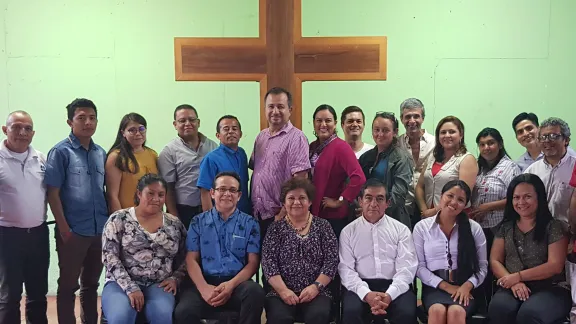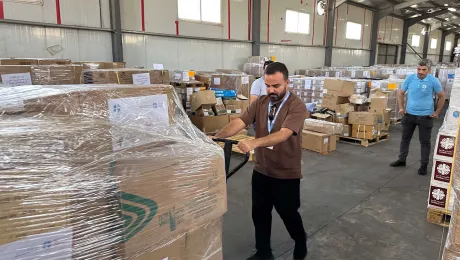
Participants at the LWF advocacy training workshop in San José, Costa Rica, 14-16 July. Photo: LWF/F. Wilches
Strengthening local and national advocacy
(LWI) - The persecution and killing of human rights defenders in Central America, as well as obstacles to the exercise of religious freedom in the region were under the spotlight at an advocacy training workshop in San José, Costa Rica, 14 -16 July. The Lutheran World Federation (LWF) event was attended by 21 participants from six of the communion’s member churches in Central America and North America and from the World Service regional program.
The training facilitated by the LWF Office for International Affairs and Human Rights was an important opportunity for participants to share experiences of advocacy in their local and national contexts, hear about good practices and learn basic guidelines for effective advocacy work from a rights-based approach including gender analysis. The main tool used was the recently published LWF Advocacy Handbook, which is available in English, French and Spanish.
Participants talked about their concerns for the plight of human rights’ defenders who risk their lives on a daily basis in pursuit of justice and peace in their countries. They also discussed other human rights issues including limitations to freedom of expression and peaceful assembly, the rights of indigenous peoples, the challenges facing those living with HIV and the importance of a critical approach to the role of the churches in the public space.
Biblical and theological basis
For some of the participants, it was their first experience of this kind of training, while for others, it marked an opportunity to understand how to do advocacy in a more systematic and analytical way. Key to that understanding is the biblical and theological basis which underpins the LWF’s approach to advocacy and human rights.
Training for all participants was focused on both theoretical learning and practical exercises, with a particular focus on the advocacy handbook. Another important highlight was the understanding that all LWF’s advocacy work is motivated and sustained by the hope and strength found in the Christian faith, the Lutheran communion as a global body, and the resilience of the communities with whom the LWF works.
Participants were also encouraged to read and use other LWF resources, such as the LWF Gender Justice Policy and the publication Affirming Women's Human Rights.
What makes this handbook special is its attempt to equip human rights defenders with a wide range of practical strategies that link local and global advocacy actions for meaningful impact at grass roots level.
The training is expected to be replicated in the other LWF regions over the coming years with the goal of helping the member churches, country programs and communities to strengthen their capacity to work on advocacy and human rights. LWF Assistant General Secretary for International Affairs and Human Rights Dr Ojot Miru Ojulu said: “What makes this handbook special is its attempt to equip human rights defenders with a wide range of practical strategies that link local and global advocacy actions for meaningful impact at grass roots level.”


